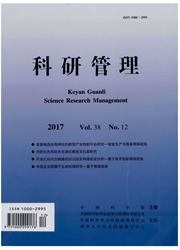

 中文摘要:
中文摘要:
将既有企业的创新政策划分为两类:"鼓励员工创新"政策和"拒绝员工创新"政策,是否采取"鼓励员工创新"政策成为既有企业的一项重要决策。本文通过构筑既有企业与员工的多期博弈模型,剖析了既有企业创新政策选择决策的影响因素。研究发现:机会转化为商业化发明的概率越大、可商业化的发明产生的收益越大,则既有企业越倾向于采取"鼓励员工创新"政策;在企业内部开发机会时员工分享的收益越大、给定项目的产出越大、有风险类型项目的风险越小、员工发现机会的概率越大,则既有企业越倾向于采取"拒绝员工创新"政策。最后讨论了本研究的管理启示与研究不足。
 英文摘要:
英文摘要:
The enterprise has two different kinds of innovation polices: the policy of encouraging employees to have innovation and the policy of forbidding employee to have innovation. To encourage employees to have innovation or to forbid employees to have innovation is an important decision for enterprises to make. Based on the multi- period game model of enterprises and employees,this paper analyzes the factors which will influence enterprises' choice of two different kinds of innovation polices. This study has found that the greater the probability that opportunities are translated into commercial inventions,and the greater the benefit that the commercial inventions may generate,enterprises are more likely to choose the policy of encouraging employees to have innovation; when opportunities are developed in enterprises,the greater the employee can share the benefit of project,the greater the output of a given project,the smaller the risk of the risky project,and the greater the probability that employees will find opportunities,the enterprises are more likely to choose the policy of forbidding employees to have innovation. In the end,the management implications and limitations are discussed in this paper.
 同期刊论文项目
同期刊论文项目
 同项目期刊论文
同项目期刊论文
 期刊信息
期刊信息
